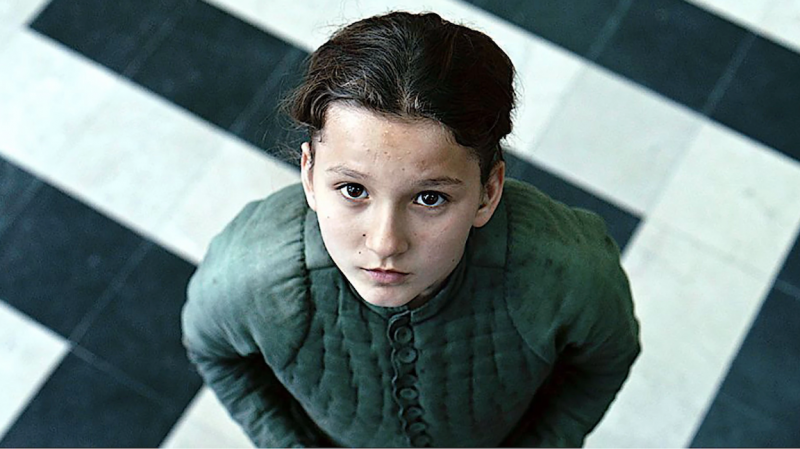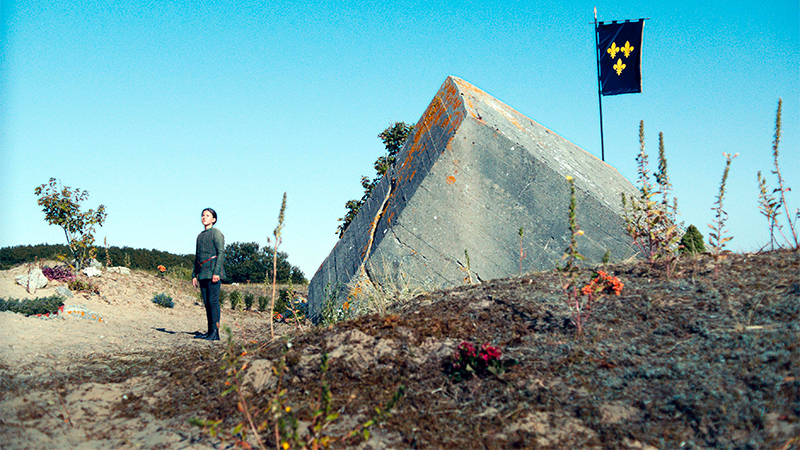Joan of Arc review – tough little number | reviews, news & interviews
Joan of Arc review – tough little number
Joan of Arc review – tough little number
Part Two of Bruno Dumont's musical biopic ranges from scathing to compassionate

Jeanne d’Arc was 19, she believed, when she was tried for heresy by her English enemies in Rouen in 1431. Of the actors who have played her onscreen – Falconetti, Ingrid Bergman, Jean Seberg, Leelee Sobieski, Milla Jovovich among them – none has evinced more wolf-cub-like fierceness or childlike purity of purpose than does Lise Leplat Prudhomme.
Prudhomme appeared in the first half of Jeannette as the little girl shepherdess who receives saintly visions and sings and dances to pastoral songs that morph into death metal anthems, performed by the genre-mashing multi-instrumentalist Igorrr, as she experiences religious ecstasy. Jeanne Voisin, the young woman who played the adolescent Jeanne in the film’s second half, apparently changed her mind about continuing in the role in Joan of Arc. Dumont, left in the lurch, turned to Prudhomme.
Given her tender years, she embodies in her perfomance the surreal youthfulness of the peasant mystic-warrior who led the French army to victories at Orléans, Patay, and Troyes, enabling Charles VII’s consecration, during the Hundred Years War. It was an inspired move by Dumont – less gimmicky than the casting of kids as hoodlums and molls in Alan Parker’s Bugsy Malone (1976), more in line with Dennis Potter’s choosing adults to magnify the mannerisms of the kids they play in Stand Up, Nigel Barton (1965) and Blue Remembered Hills (1979), an incongruity also used in the 1969 Monty Python “Children's Interview” sketch featuring Eric Idle and Michael Palin as schoolboys.
In Joan of Arc's first act, Jeanne consults with her captains on scrubby sand dunes near World War II military emplacements and their ruins (Prudhomme, pictured below) while the battles rage offscreen. The devil-faced punk with running sores who angrily upbraids her for preaching to the troops about “God, love, sin, prayer,” instead of encouraging them to go looting, is the future mass-murderer of children Gilles de Rais (Julien Manier).
 Jeanne’s soldiering career collapses with defeat by Burgundian forces at the siege of Compiégne, depicted by Dumont as a dreamy, aerially photographed equestrian ballet, choreographed like a Busby Berkeley routine, in which the rival cavalries wheel around each other but don’t engage. There’s a suspicion that Dumont is mocking such artifice even as he uses it for a mildly diverting spectacle. More affectingly ominous is a subsequent shot, announcing the absent Jeanne’s capture, in which her riderless horse canters into a clearing.
Jeanne’s soldiering career collapses with defeat by Burgundian forces at the siege of Compiégne, depicted by Dumont as a dreamy, aerially photographed equestrian ballet, choreographed like a Busby Berkeley routine, in which the rival cavalries wheel around each other but don’t engage. There’s a suspicion that Dumont is mocking such artifice even as he uses it for a mildly diverting spectacle. More affectingly ominous is a subsequent shot, announcing the absent Jeanne’s capture, in which her riderless horse canters into a clearing.
The rest of the film stresses the tragicomic absurdity of Jeanne's show trial, which was filmed in Amiens’ dauntingly huge cathedral. The defiant androgynous riot grrrl unflinchingly confounds the corrupt, hypocritical high-ranking clerics and ecclesiastical scholars sent to convict her. They disingenuously offer her clemency while conspiring to ensure that the secular authorities will take full responsibility for burning her at the stake.
Never averse to scolding the Catholic Church for its crimes, the religious atheist Dumont adapted his spartan non-naturalistic diptych from Charles Péguy’s play The Mystery of the Charity of Joan of Arc (1910). The topsy-turvy casting serves as a Brechtian device, intentional or not, that distances the viewer from the physical circumstances of Jeanne’s military campaigns and the ensuing courtroom drama to emphasize, through Péguy’s words, her rational, humanistic ideas in the face of her prosecutors’ cant. As her chief denouncer, the gangling Fabien Fenet channels John Cleese in wild-eyed loon mode, echoing Monty Python’s influence on Dumont’s grand guignol comedy Slack Bay (2016), which also featured Fenet as a clergyman.
Instead of heavy metal, Jeanne now hears the late Christophe’s fragile synth pop tunes and his anxious, scratchy singing of lyrics drawn from Péguy. If the songs don’t quite come off as bulletins from Jeanne’s interior monologue, they suit the strange blend of scrappiness, gracefulness, and deadpan humour that characterizes Dumont’s recent films.
Departing from the bleakness and shock tactics of such early provocations as La Vie de Jésus (1997) and Humanité (1998), Dumont showed signs of mellowing with P’tit Quinquin (2014), the heartfelt murder mystery miniseries that remains his best work, and the dotty Slack Bay (for all its cannibalism). Though his Joan of Arc films feel like preparatory experiments for the masterpiece he has yet to deliver, they suffice as semi-whimsical works of scathing criticism and surprising compassion. You have to cheer a wise, self-sacrificing hoyden heroine who speaks to this century as she did the 1500s: “Men are what they are, but we must think about what we must be".
Add comment
The future of Arts Journalism
You can stop theartsdesk.com closing!
We urgently need financing to survive. Our fundraising drive has thus far raised £49,000 but we need to reach £100,000 or we will be forced to close. Please contribute here: https://gofund.me/c3f6033d
And if you can forward this information to anyone who might assist, we’d be grateful.

Subscribe to theartsdesk.com
Thank you for continuing to read our work on theartsdesk.com. For unlimited access to every article in its entirety, including our archive of more than 15,000 pieces, we're asking for £5 per month or £40 per year. We feel it's a very good deal, and hope you do too.
To take a subscription now simply click here.
And if you're looking for that extra gift for a friend or family member, why not treat them to a theartsdesk.com gift subscription?
more Film
 Urchin review - superb homeless drama
Frank Dillane gives a star-making turn in Harris Dickinson’s impressive directorial debut
Urchin review - superb homeless drama
Frank Dillane gives a star-making turn in Harris Dickinson’s impressive directorial debut
 Mr Blake at Your Service review - John Malkovich in unlikely role as an English butler
Weird comedy directed by novelist Gilles Legardinier
Mr Blake at Your Service review - John Malkovich in unlikely role as an English butler
Weird comedy directed by novelist Gilles Legardinier
 Don't Let's Go to the Dogs Tonight review - vivid adaptation of a memoir about a Rhodesian childhood
Embeth Davidtz delivers an impressive directing debut and an exceptional child star
Don't Let's Go to the Dogs Tonight review - vivid adaptation of a memoir about a Rhodesian childhood
Embeth Davidtz delivers an impressive directing debut and an exceptional child star
 One Battle After Another review - Paul Thomas Anderson satirises America's culture wars
Leonardo DiCaprio, Teyana Taylor, and Sean Penn star in a rollercoasting political thriller
One Battle After Another review - Paul Thomas Anderson satirises America's culture wars
Leonardo DiCaprio, Teyana Taylor, and Sean Penn star in a rollercoasting political thriller
 Steve review - educator in crisis
Cillian Murphy excels as a troubled headmaster working with delinquent boys
Steve review - educator in crisis
Cillian Murphy excels as a troubled headmaster working with delinquent boys
 Can I get a Witness? review - time to die before you get old
Ann Marie Fleming directs Sandra Oh in dystopian fantasy that fails to ignite
Can I get a Witness? review - time to die before you get old
Ann Marie Fleming directs Sandra Oh in dystopian fantasy that fails to ignite
 Happyend review - the kids are never alright
In this futuristic blackboard jungle everything is a bit too manicured
Happyend review - the kids are never alright
In this futuristic blackboard jungle everything is a bit too manicured
 Robert Redford (1936-2025)
The star was more admired within the screen trade than by the critics
Robert Redford (1936-2025)
The star was more admired within the screen trade than by the critics
 Blu-ray: The Sons of Great Bear
DEFA's first 'Red Western': a revisionist take on colonial expansion
Blu-ray: The Sons of Great Bear
DEFA's first 'Red Western': a revisionist take on colonial expansion
 Spinal Tap II: The End Continues review - comedy rock band fails to revive past glories
Belated satirical sequel runs out of gas
Spinal Tap II: The End Continues review - comedy rock band fails to revive past glories
Belated satirical sequel runs out of gas

Comments
Not sure whether it's the
Thank you. I greatly
Thank you. I greatly appreciate you reading the review. You are right about Joan's role in the French military campaigns. I took a liberty with "led" as, by all accounts, she was a figurehead, not any kind of general or caotain. (In the film, she talks about carrying a flag into battle, but never wielding a sword). Only one English cleric appears during the trial scenes, but the French prosecutors make several contemptuous remarks about the English. It is Joan's French enemies, though. who provoke Dumont's ire.